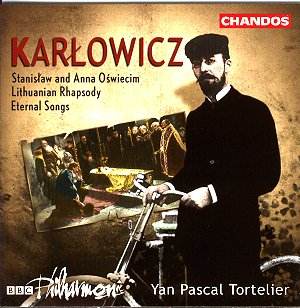This new Chandos CD is notable on several counts. It
is the 100th recording by the BBC Philharmonic Orchestra
for the label. It appears just as Yan Pascal Tortelier steps down after
a very successful decade as the orchestra’s Principal Conductor. Last,
but by no means least, it makes available three important orchestral
works by a neglected Polish composer.
Mieczysław Karłowicz
was born in Lithuania in 1876. Initially he trained as a violinist but
he devoted himself to composition after going to Berlin for further
studies in 1895. His composing career thus spanned a mere fourteen years
before his tragically premature death in a skiing accident. However,
in that time he had managed to assemble a portfolio of works which included
a symphony, a violin concerto, songs and six symphonic poems. The symphonic
poems were all written between 1903 and 1908 and Tortelier has chosen
to record three of them here.
Eternal Songs was the second of Karłowicz’s
compositions in this genre. It dates from 1906 and is in three movements.
The music does not illustrate a story. Rather, like Strauss’s Also
Sprach Zarathustra, it is inspired by philosophy. As Alistair Wightman
avers in his notes: "there seems little doubt that the work depicts
Nirvana-like extinction of the self through the universe, reflecting
the impact both of Schopenhauer’s philosophy and of mystical experiences
enjoyed by the composer in the Tatra Mountains." The three movements
are entitled ‘Song of Everlasting Yearning’; ‘Song of Love and Death’;
and ‘Song of Eternal Being’.
With titles such as those you might well expect that
the music would be predominantly in, what Wightman aptly terms, a "characteristically
melancholy, late-romantic idiom" and you would be right. The first
movement is in an arch form with brooding music, heard at the outset
on strings and wind, encasing a brief, impassioned climax, dominated
by the brass. The second movement begins with a memorable string melody
but once again the emotions soon start to boil in anticipation of another
huge climax. This gives way to a lovely, consolatory passage which is
interrupted by a strong, heroic episode before a serene close. The first
two movements have been mainly slow in tempo. The final one is much
more vigorous and provides a welcome contrast. Throughout, the orchestration
is very full but it is not excessive and, anyway, Tortelier balances
his forces astutely so as to ensure as much clarity of texture as possible.
Stanisław and
Anna Oswiecim is a narrative piece and possibly because of this
it strikes me as being the best music on the disc. Composed in 1907,
it tells the tale of a brother and sister’s incestuous love affair.
The story is based on a seventieth-century legend and Karłowicz
described it as a “Polish travesty of Romeo and Juliet.”
The opening presents themes for each lover, Anna being represented by
an extended, tender melody which we first hear on the oboe (Track 4,
2’04”). Karłowicz then illustrates their romance at some
length in suitably passionate music. In the legend Stanisław
eventually journeys to Rome to seek the Pope’s approval for their union.
Somehow he succeeds in persuading the Pope but, inevitably, on his return
he finds his sister dead, a moment which the music graphically
portrays (Track 4, from 13’39"). The piece then culminates in an
intense and highly charged funeral elegy. This is a powerful and vivid
piece which is clearly the product of a fertile musical imagination.
Lithuanian Rhapsody (1906) is very different
from its two companions. It is a lighter piece and is based on Lithuanian
folk melodies. It is fairly simple in structure, consisting of five
short, continuous sections derived from four folksongs. Inevitably,
perhaps, it is the most overtly Slavic
music on the disc. It is engaging and enjoyable and its inclusion represents
intelligent programme planning on someone’s part as it shows us a different
side to Karłowicz’s musical persona.
Yan Pascal Tortelier directs powerful, committed performances
of all three works and his BBC players respond splendidly, living up
to the high standards which they have achieved pretty consistently with
him during the last ten years. The recorded sound is excellent: full
and detailed. There are good notes by Alistair Wightman, the author
of a Scolar/Ashgate book about the composer.
May I drop a couple of hints to Chandos? I’d like to
hear more of Karłowicz’s music (the
other three symphonic poems, perhaps?) Secondly, though Yan Pascal Tortelier
will no longer be at the head of the BBC Philharmonic I hope that he
will be regularly reunited with them in the recording studio in the
future.
This fine CD is yet another enterprising release from
Chandos and it provides a fascinating introduction to an unfamiliar
composer. I recommend it confidently.
John Quinn


